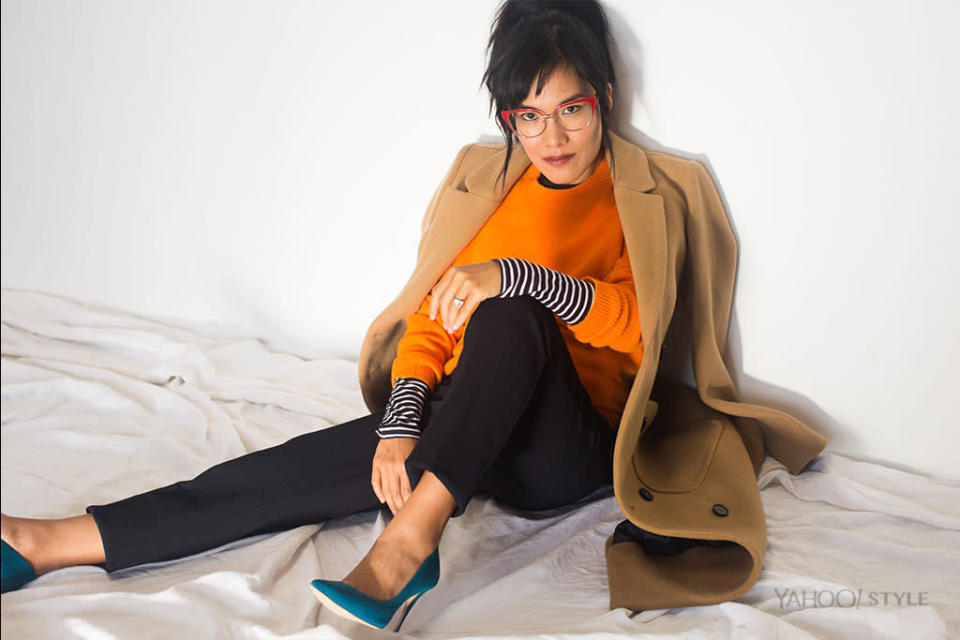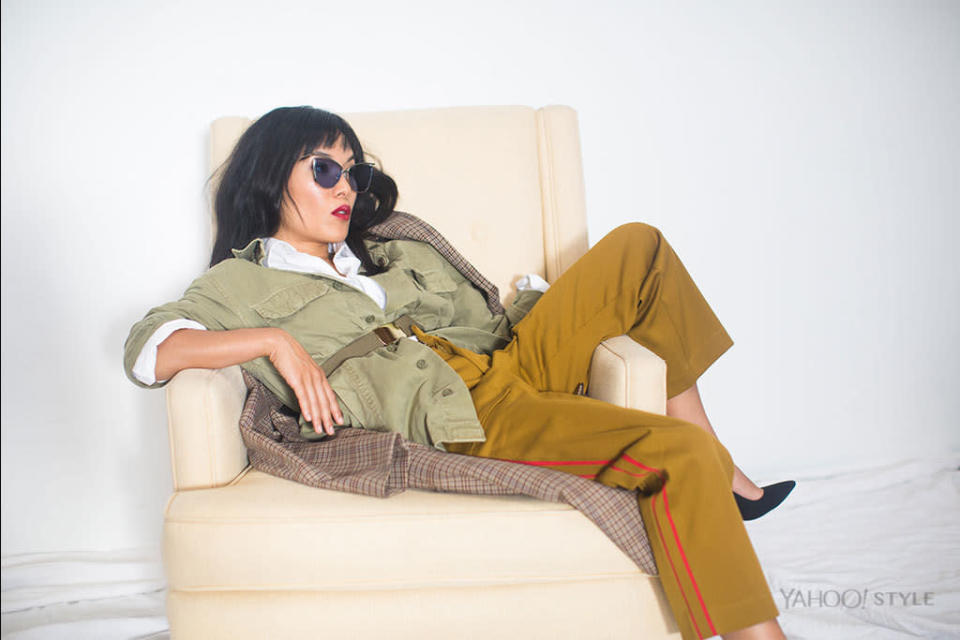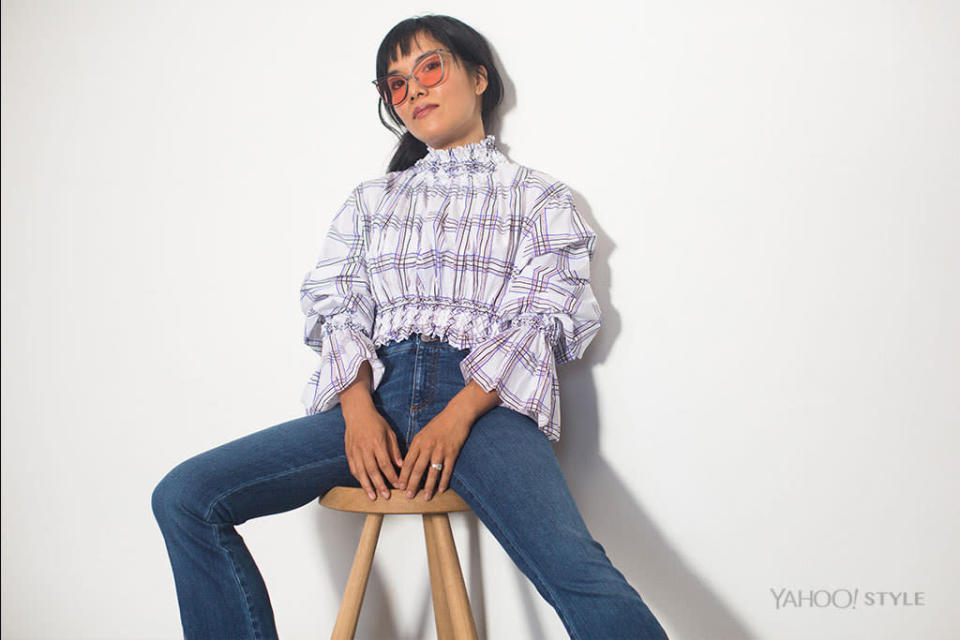After ‘Baby Cobra,’ Comedian Ali Wong Is as Honest and Funny as Ever About Pregnancy, Sexism, and What It Means to Be Asian-American in Hollywood
Photography by Jeana Sohn
Styling by Christopher Kim
Hair by Brian Fisher
Makeup by Hinako
Comedian Ali Wong’s special Baby Cobra dropped in May, and within days a murderers’ row of funny people had tweeted out their support. Amy Schumer called it “amazing.” Jim Gaffigan christened Wong “the real deal.” Hallelujah. This woman’s a lightning rod: a fearless, frank voice who calls bullshit on once-taboo topics, diffusing pain by pointing out how universal these experiences truly are. Of her miscarriage, Wong cracked, “I used it as leverage and held that shit over my husband’s head for a month. He took me to see Beyoncé. He bought me a bike off of Craigslist. For 30 days, I had the marriage I always wanted.”
Baby Cobra was shocking. Not because Wong buttoned a joke about anal sex by singing a line from Disney’s Aladdin (“A whole new world…”). More so because she filmed the entire thing while she was seven and a half months pregnant, dressed in a body-hugging sheath from H&M and Jason Wu jelly flats. But her crass tongue is a veneer that distracts the audience just long enough for her to pummel them with a razor-sharp cultural critique. (“For marriage, it can be nice to be with somebody of your own race,” she deadpanned. “The advantage is that you get to go home and be racist together.”) Netflix’s Baby Cobra was a career-making moment for Wong, who is also a writer on ABC’s Fresh Off the Boat, and she’s now fielding offers to create and star in her own sitcom. How do you follow an explosion? Apparently by turning those offers down.
Wong, 34, meets me for breakfast at a coffee shop in Culver City not far from the house she shares with her civilian husband, Justin Hakuta (a Harvard MBA who works in tech) and their newborn daughter, Mari, named after Marie Kondo, whose book, The Life-Changing Magic of Tidying Up, finally convinced Wong to throw out reams of oppressive paperwork she’d been carting around as well as a pair of “S&M bondage heels” she’d been saving for some unknown reason. “I was like, Maybe there will be some event? When I touched the heels, I was like, My feet already hurt. This does not spark joy.” She adds on a more serious note, “The book meant a lot to me. Does this spark joy is such an easy question to answer, you know?”
Perhaps the same logic applies to her career. Of the sitcom offers coming her way, she says, “I turned some of those deals down because when I do it, I want it to be good.” It seems she’s waiting for the moment she can have real creative control. “What happens for a lot of standup comics is that they have this great point of view and people get really excited about it. Then they get paired up with this stranger — a showrunner who doesn’t really know them — and then they get steamrolled.”
This is a rare free morning for Wong, who juggles her writing duties and standup appearances with a supporting role on ABC’s American Housewife (premiering this fall). The night before, she headlined a show at Largo, the hip comedy theater in West Hollywood, where she workshopped new material — on the pain of motherhood (a “whack-ass job”), lactation consultants, and C-sections. Basically, everything that happened after Baby Cobra.
Wong didn’t take much of a maternity leave. She got back onstage a month after her daughter was born because, well, this is what it means to be a standup comedian. She puts her baby to bed at 8 p.m., and then she’s out five nights a week, appearing at the Comedy Store on the Sunset Strip and at a bunch of small rooms you probably haven’t heard of. Like Chris Rock and Marc Maron, Wong writes mostly onstage, unafraid of bombing as she massages and rethinks the turns of a joke in real time. She is working on a bit now about mindless sexism. She often encounters people who stare at her quizzically, wondering, “If you’re here, who’s with the baby?” Wong shouts something like, “Who the fuck do you think is with the baby? Her dad!”
Wong may joke that feminism is the worst thing that ever happened to women (“Our job used to be no job!”), but Wong is a sly activist. There’s a moment in Baby Cobra that feels destined to be retweeted and GIF-ed and maybe even cited in academic studies on equal pay. “Female comics don’t get pregnant,” she says, staring out at the audience. “Once they do get pregnant, they generally disappear. That’s not the case with male comics. Once they have a baby, they’ll get up onstage a week after and be like, ‘Guys, I just had a fucking baby, that baby’s a little piece of shit, it’s so annoying and boring!’ And all these other shitty dads in the audience are like, ‘That’s hilarious! I identify!’ And their fame just swells, because they’ve become this relatable family funnyman all of a sudden. Meanwhile, the mom is at home chapping her nipples, feeding the fucking baby, and wearing a frozen diaper because her pussy needs to heal from the baby’s head shredding it up. She’s busy!”
It’s worth noting, that hourlong special ends with a throwaway joke about how, shortly after she got married, Wong discovered that her husband was secretly $70,000 in debt. “He trapped me!” she told the audience, revealing that she paid his debts immediately — in full. When I ask if he was angry that she’d aired his dirty laundry on Netflix, she stared at me blankly: “I earned the right to say that.”
Hers is one of those overnight success stories that took 10 years of hard sweat equity. She recalls an early gig in St. Louis. “It was the last smoking club in America,” she says, “and I have asthma. They have no green room. Which means you don’t have anyplace to hide. You’re just, like, hanging out by the bar. No one knew who I was. It was super rowdy. The hotel was on the side of a freeway, and I was so lonely and so homesick, I would take a cab 35 minutes out to this Laotian restaurant that I found on Yelp just to eat noodle soup.”
Wong, who is half-Chinese and half-Vietnamese, was raised in San Francisco, the youngest of four children. Her dad, an anesthesiologist, was born in the States. Her mom came over from Vietnam on a college scholarship in 1960. By all accounts Ali had an unconventional childhood. Onstage at Largo — dressed in a Philip Lim top, a navy silk skort from Zara, and her signature oversize frames — she told a story about how, when she was growing up, her dad once went into a store and asked if they had a bathroom. When the salesperson told him they didn’t, he was so frustrated he pulled a glass jar out of his bag and urinated in it on the spot. Well, he shouted, “now you do!”
“My dad was obviously a really quirky, unconventional Asian man who didn’t care about what other people thought,” Wong says, removing her Invisalign to take a bite of breakfast chicken sausage. “When he would fight with my mom, he would be really dramatic. He would be like, ‘Devil, get away for I am God’s property.’ He would say crazy things that were so melodramatic but so theatrical and funny. They loved each other a lot, but these were not chill people.” When asked what she learned about marriage from them, she says, “I learned fuego on fuego is not really what I want. My husband’s chill.”
As a student at UCLA, Wong joined an improv comedy troupe called Stage Ninjas, where she met future Fresh Off the Boat star Randall Park. She majored in Asian-American studies and graduated with honors. But when she suddenly announced she wanted to make a career out of comedy, nobody flinched. “My parents were kind of upset, and then they got onboard, like, in two seconds,” she says. I guess when you are the fourth child, parents aren’t shocked by much anymore.
Wong insists she didn’t set out to become a role model for other female comedians; she’s just trying to be funny. She doesn’t even acknowledge her pregnancy until 40 minutes into Baby Cobra. (She filmed the special while pregnant because, well, she was pregnant.) “I’m never out to make any sort of message or anything like that,” she says. “I’m happy for other women to see me pregnant. And I’m doing my best to make it work now. But, I mean, it’s not easy. I’m tired. When people are like, ‘How do you make it work?’ I’m like, ‘I don’t shower. I change my panty liner. That’s how I shower.’” Breastfeeding was so stressful she started clenching her jaw, which caused her teeth to shift. Hence the Invisalign.
This woman will suffer for her art. While she may not see herself as a revolutionary, she inspires simply by living her truth. By refusing to disappear. And by acknowledging that new mothers need help sometimes. Onstage at Largo, she tried out a new bit about how the other moms at the park think she must be super rich because she has a white nanny. The joke killed, but Wong isn’t quite satisfied with it yet.
“There’s something I want to say, and I haven’t been able to articulate it yet,” she tells me, “about how it’s so rude when people don’t admit that they have a nanny. Like when celebrities get asked, ‘How do you stay in such great shape?’ They’re like, ‘Oh, I chase my kids around.’ Shut the fuck up! You have three nannies. And that allows you to go to Pop Physique or Physique57 or barre class. There’s something in that shame. I really go after that. If something’s shameful, then I’m really like, ‘All right, that’s bait.’”
Though Wong destroyed at Largo, she estimates that only 15 minutes of that new hourlong set might make her next special. Judd Apatow, one of the night’s surprise guests, might disagree with her cutting any of the material. He appeared onstage after Wong, mumbling something like, “She just murdered. I don’t have murder material.”
To put it another way, this is a whole new world. Wong is at a real inflection point in her career. She’s moving up from comedy clubs to playing theaters. And she’s connecting with audiences because she has something real and vital to say. She recently tried out a sly joke about whitewashing in Hollywood, making a punch line out of Scarlett Johannson’s controversial casting — as a Japanese woman in Ghost in the Shell (an upcoming adaptation of the popular manga series). Whitewashing is a hot topic in town these days. When the trailer for Zhang Yimou’s Chinese epic The Great Wall surfaced online earlier this year, Fresh Off the Boat star Constance Wu posted a lengthy screed to Twitter, writing, “We have to stop perpetuating the racist myth that only a white man can save the world.… Our heroes don’t look like Matt Damon. They look like Malala. Ghandi. Mandela. Your big sister when she stood up for you to those bullies that one time.… Can we all at least agree that hero-bias & ‘but it’s really hard to finance’ are no longer excuses for racism?”
“It’s a huge issue,” Wong says, though she takes delight in the whiff of change in the air, of the power she feels as a writer. “Writing is the life blood of everything in Hollywood. Without writers, there are no scripts, no acting work. All the change will come from there. Yes, there’s so much to be upset about, but there is also much to be celebrated. Look at Jane the Virgin. Key and Peele. Those guys didn’t just come out of nowhere; they’ve been hustling. Then, from their voices stemmed this freaking awesome show. Now, you see this whole new crop of female showrunners. Jenji Kohan, Jill Soloway. There’s tons of them, and they’re creating the best television.” Wong adds: “There is this tone of shaming the industry into diversity. But what’s cool now is it’s becoming less of an ethical or moral decision and more of a business decision.” In other words, the audience has spoken. They’re starved — and primed — for diverse voices. A whole new world indeed.
Follow us on Instagram, Facebook, and Pinterest for nonstop inspiration delivered fresh to your feed, every day.







